Having been dubbed ‘The Best Urban Garden in the World’ by National Geographic, the Dr. Sun Yat-Sen Classical Chinese Garden is undoubtedly Chinatown’s main attraction.
This tranquil oasis provides locals and visitors alike with a peaceful sanctuary from the hustle and bustle of urban Vancouver, making it the perfect foil to a long hard day of sightseeing.
With this guide as your chaperone, you’ll have all the information you need to see this lovely attraction as if you were a local.
- Overview
- Dr. Sun Yat-Sen Park
- Dr. Sun Yat-Sen Chinese Garden
- Prices
- Hours
- How to Get There
- Visitor Tips
- History
- FAQ
Dr. Sun Yat-Sen Classical Chinese Garden
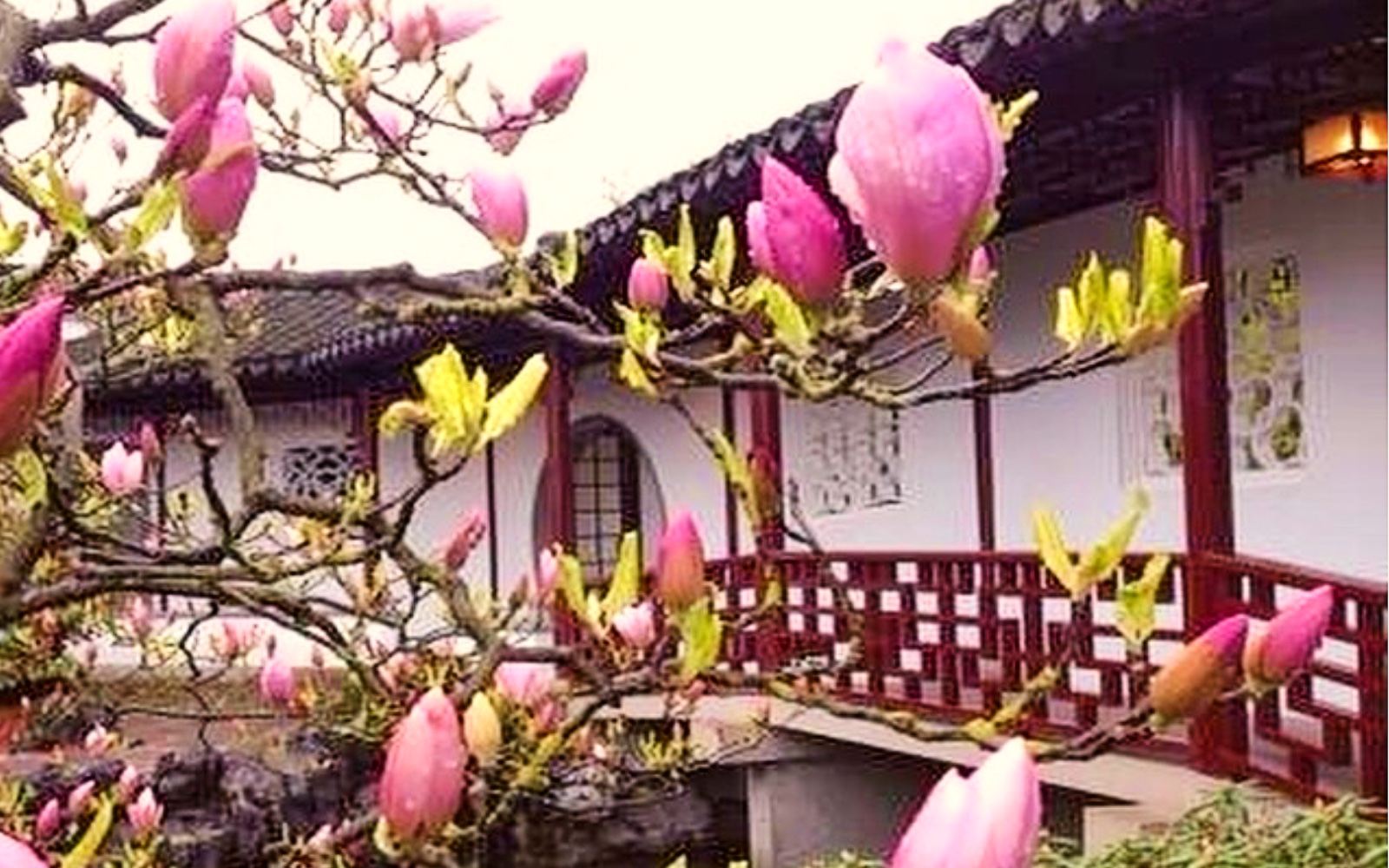
Located on Carrall Street, right in the heart of Chinatown, the Dr. Sun Yat-Sen Classical Garden is the first Scholars Garden built outside of China and remains the biggest outside of Asia.
For this reason, it is one of Vancouver’s most popular tourist attractions, and for our money one of the top things to do in Vancouver.
The site contains a freely accessible public park, in addition to the Classical Garden, the entrance to which is available for an additional fee.
Aside from Stanley Park it’s probably the most famous in the city.
Scholar’s Gardens
A Scholar’s Garden is a type of garden deeply rooted in ancient Chinese philosophy. They are created to allow for deep personal reflection and to provide an escape from the outside world.
They became popular after the fall of the Han Dynasty (206 BC-220 AD), when they were constructed as retreats for government officials and bureaucrats who’d fallen out of favour and thus wanted to escape the chaos and corruption of daily life.
These officials wanted to pursue the Taoist ideal of disengagement from worldly concerns in their pursuit of peace and harmony.

As a result, Classical Gardens are tied very closely to Taoist philosophy, and are meant to present an idealized landscape that expresses the harmony that should exist between man and nature.
The Dr. Sun Yat-Sen Classical Gardens are closely modelled on the Suzhou Gardens popularized during the Ming Dynasty, between 1368-1644. Most of these gardens were constructed by scholars, hence the term “Scholar’s Garden”.
The gardens were fashioned to employ the four essential elements, flowers, water, rocks, and architecture. Each aims to instill tranquility and harmony through their creation of balance amongst contrary forces, or yin and yang as it’s known in Chinese philosophy.
In Vancouver’s version, this balance first manifests itself in the contrast between the Garden and its surrounding urban environment.
But in a deeper sense, it can be found in the harmony between the water and the rocks, and the divergent colours of the carefully selected plants.
Dr. Sun Yat-Sen Park
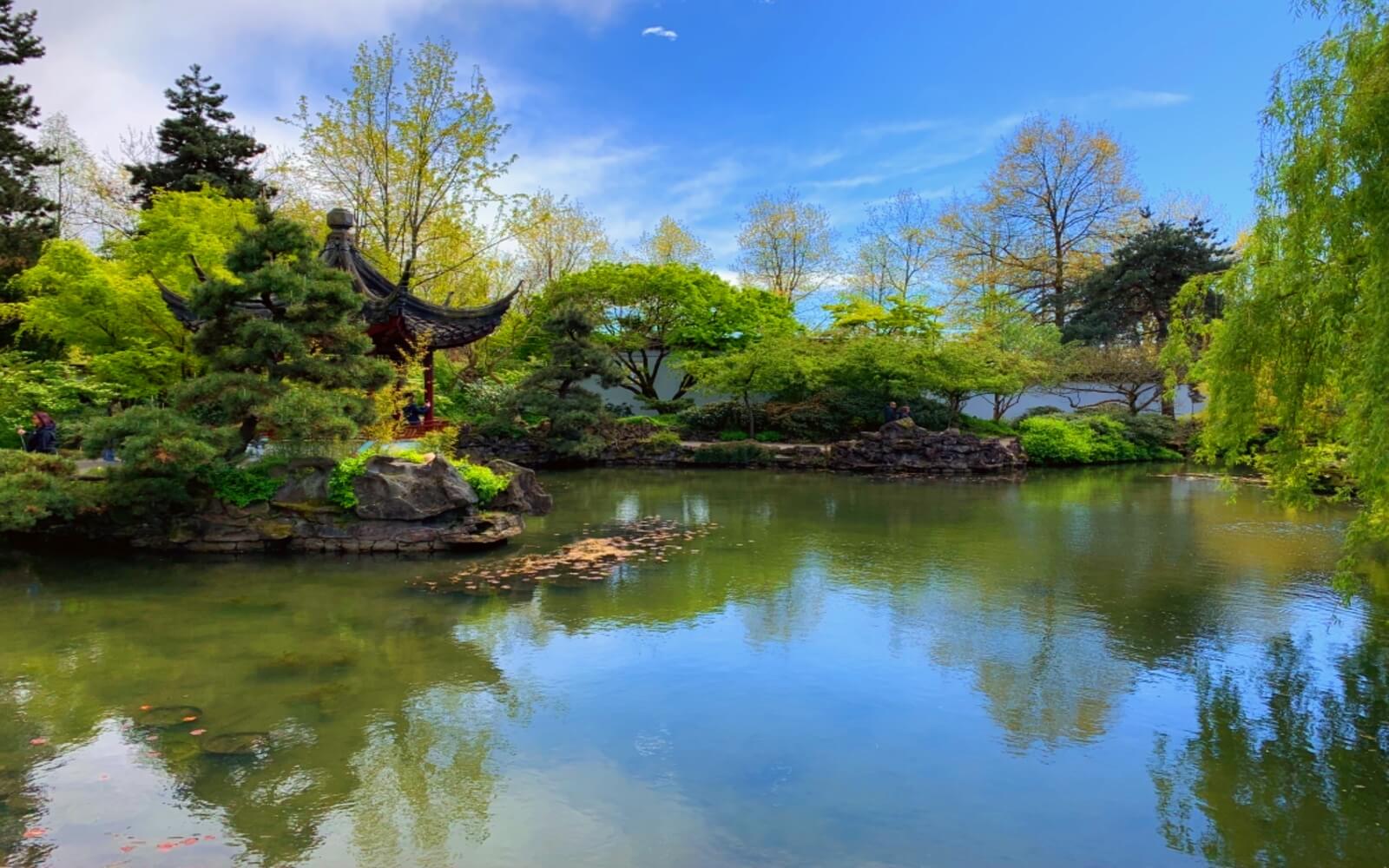
The first thing you’ll see when you arrive to the location is the Dr. Sun Yat-Sen park, which is a free public space. This makes it a fantastic place to escape from the surrounding urban environment, be it for a picnic, a walk, or just for a quick moment of reflection.
Find peace and tranquility amongst the unique rock formations, bamboo forest, and lily-covered pond, which is home to numerous koi fish, birds, and even a turtle.
Man-made attractions include a small pagoda and a statue in honour of the late Dr. Sun Yat–Sen.
While the park isn’t quite as breathtaking as the Classical Garden, it’ll give you a quick introduction to a Scholar’s Garden and help you decide if you’d like to go any further.
The Scholar’s Garden
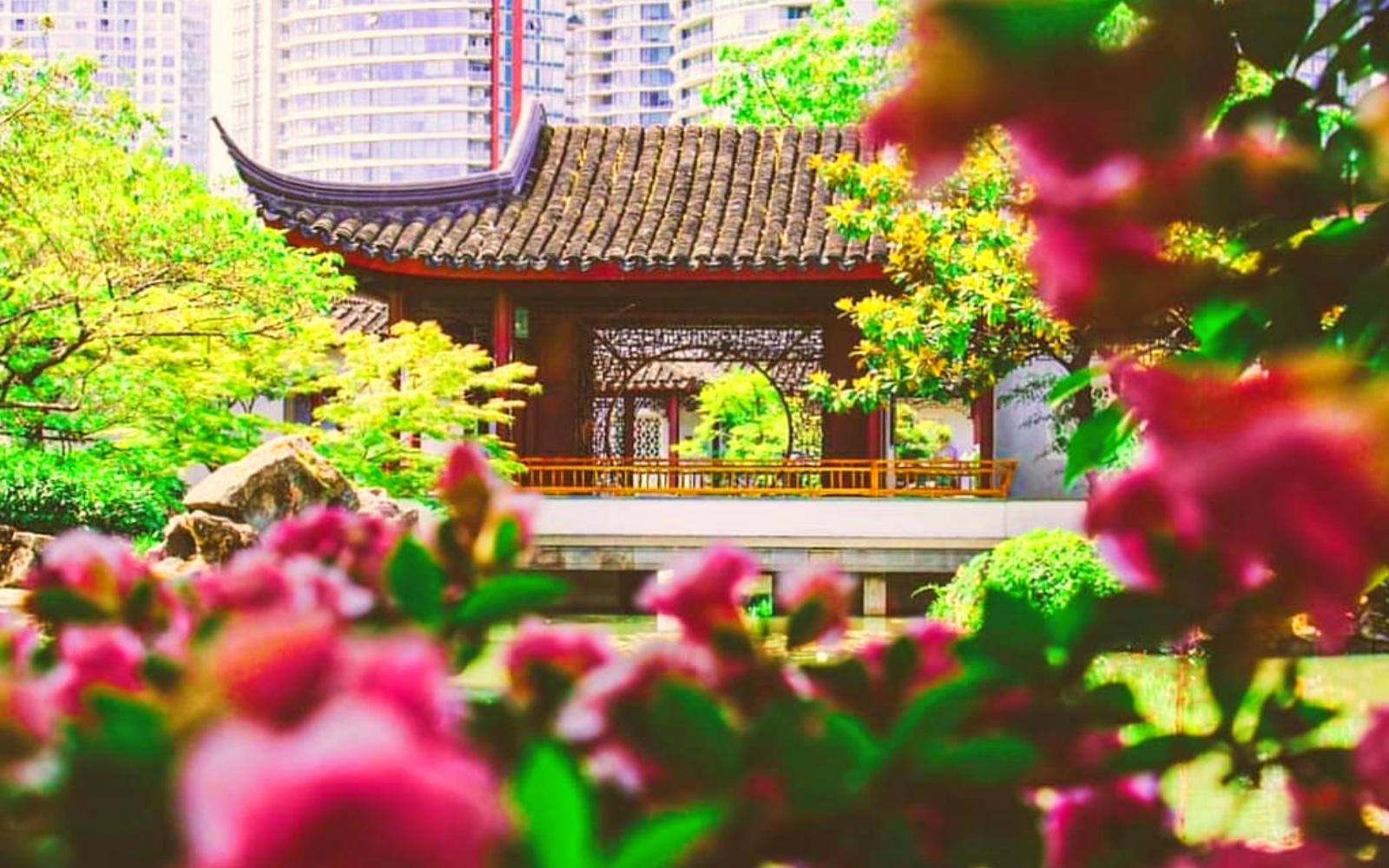
Located right next to the public park in Chinatown is its main tourist attraction, the Dr. Sun Yat-Sen Classical Garden. To help maintain the facilities a small fee is required for entrance.
This is what we came for folks!
As stated earlier, the garden was constructed in strict adherence to the Taoist principles of Yin and Yang and Feng Shui, in which the pursuit of balance is critical to the maintenance of peace and tranquility.
Now you’ll begin to see what I mean. This balance manifests itself in several ways:
- Texturally – the juxtaposition of jagged rocks and delicate flowers.
- Contrastingly – with bright hues presented alongside more muted tones.
- Generally – in the contrast between the tranquil Garden and its surrounding environment.
The balanced use of the four essential elements in the Classical Garden is critical to the maintenance of peace, harmony, and tranquility. Their manner of use is listed below.
Rocks
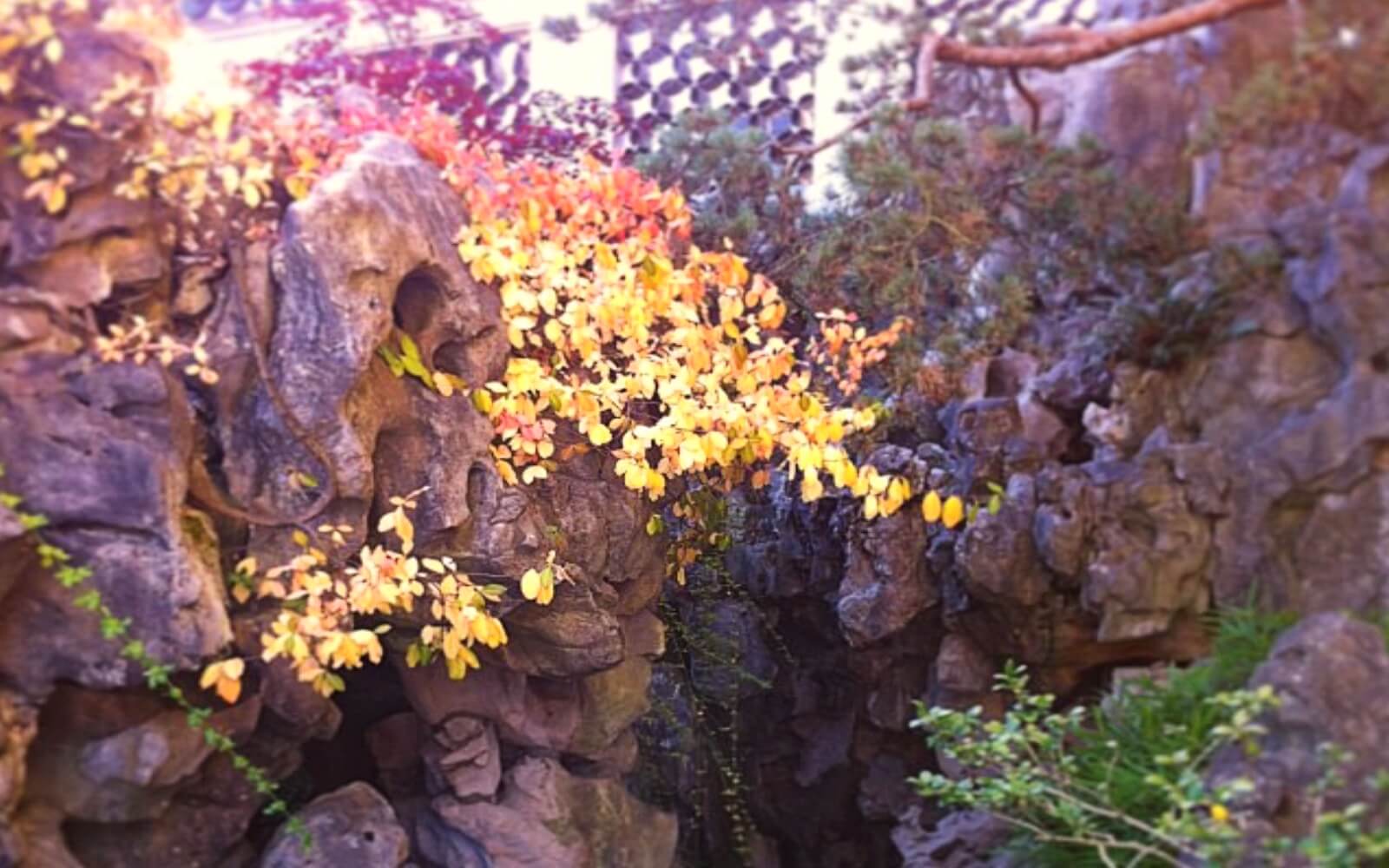
A great addition to any Vancouver itinerary, the Rock Gardens are an integral element of Classical Gardens, as the rocks are a symbol of stability, virtue and endurance.
The Dr. Sun Yat-Sen Classical Garden possesses a variety of limestone rocks sourced from Lake Tai, near the Chinese city of Suzhou. This is the home city of both the original architects and the Scholar’s Gardens that provided them with their inspiration.
The jagged rocks are meant to provide contrast to the tranquil water and delicate foliage.
Dr. Sun Yat-Sen Classical Garden Water
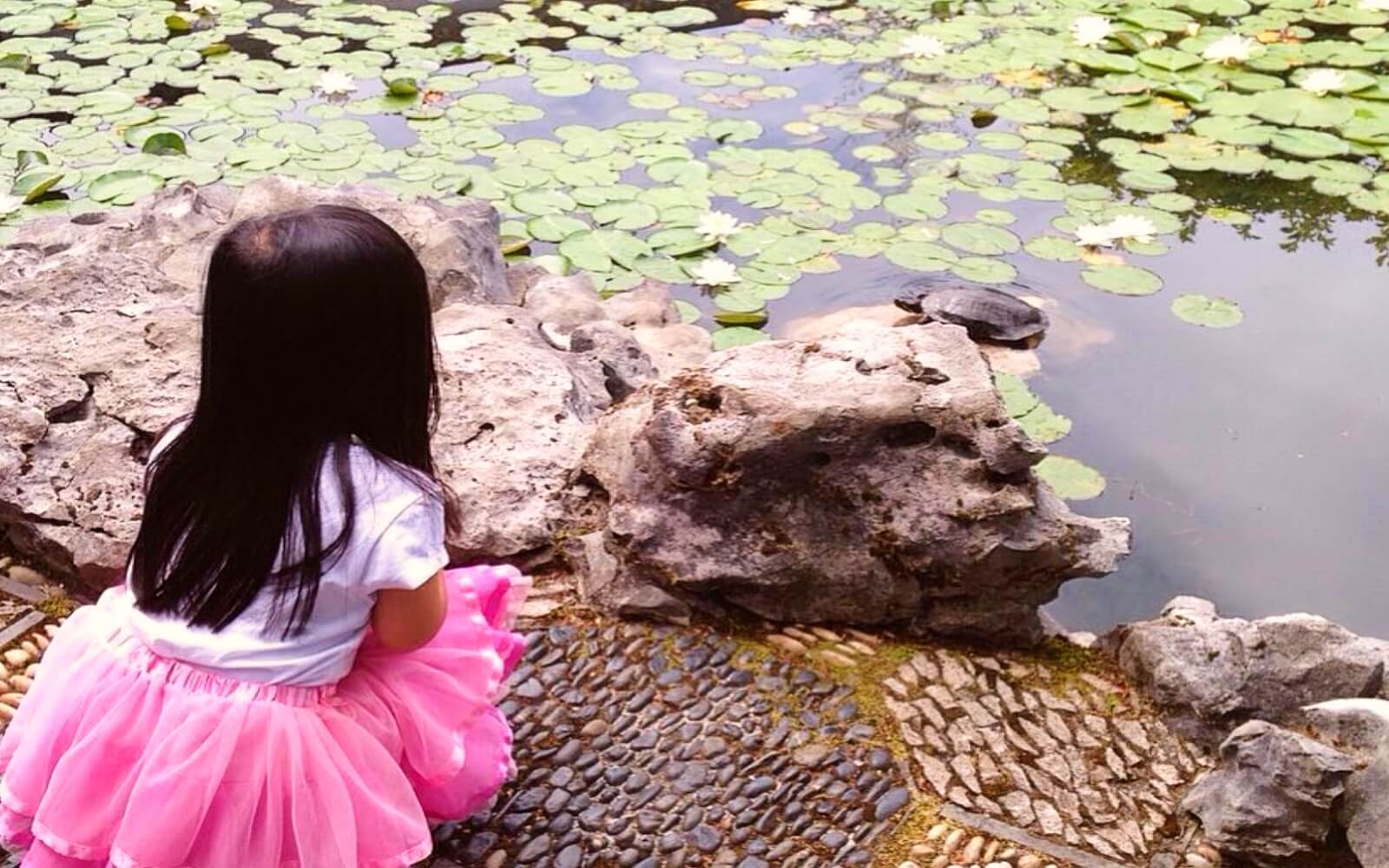
Lakes and ponds play an important symbolic role in Chinese Classical Gardens. They signal lightness and communication and form a critical counterpoint to the hardness of the rocks.
A tranquil jade-green pond forms the centrepiece of Vancouver’s Classical Garden. The pond gains its beautiful colour from the unique clay found on its bottom and provides a home to a resident turtle as well as a number of beautiful Koi fish, to further instill peace and tranquility.
However, a mischievous River Otter recently found his way into the Classical Gardens in the Fall of 2019 and decided that the beautiful Koi fish would make a tasty snack!

A team of trappers employed by the city were unable to catch him. This is resulted in the death of 11 Koi, causing a local scandal! The city was eventually forced to drain the pond to rescue the remaining Koi, much to the otter’s dismay.
With Asian show Koi often selling for upwards of a hundred thousand dollars, this was one otter with expensive tastes!
On the bright side, 344 juvenile Koi were rescued and eventually returned to the pond. So you’re very likely to encounter the prized fish, which are revered as symbols of perseverance, strength, and transformation.
Plants at the Dr. Sun Yat-Sen Classical Garden
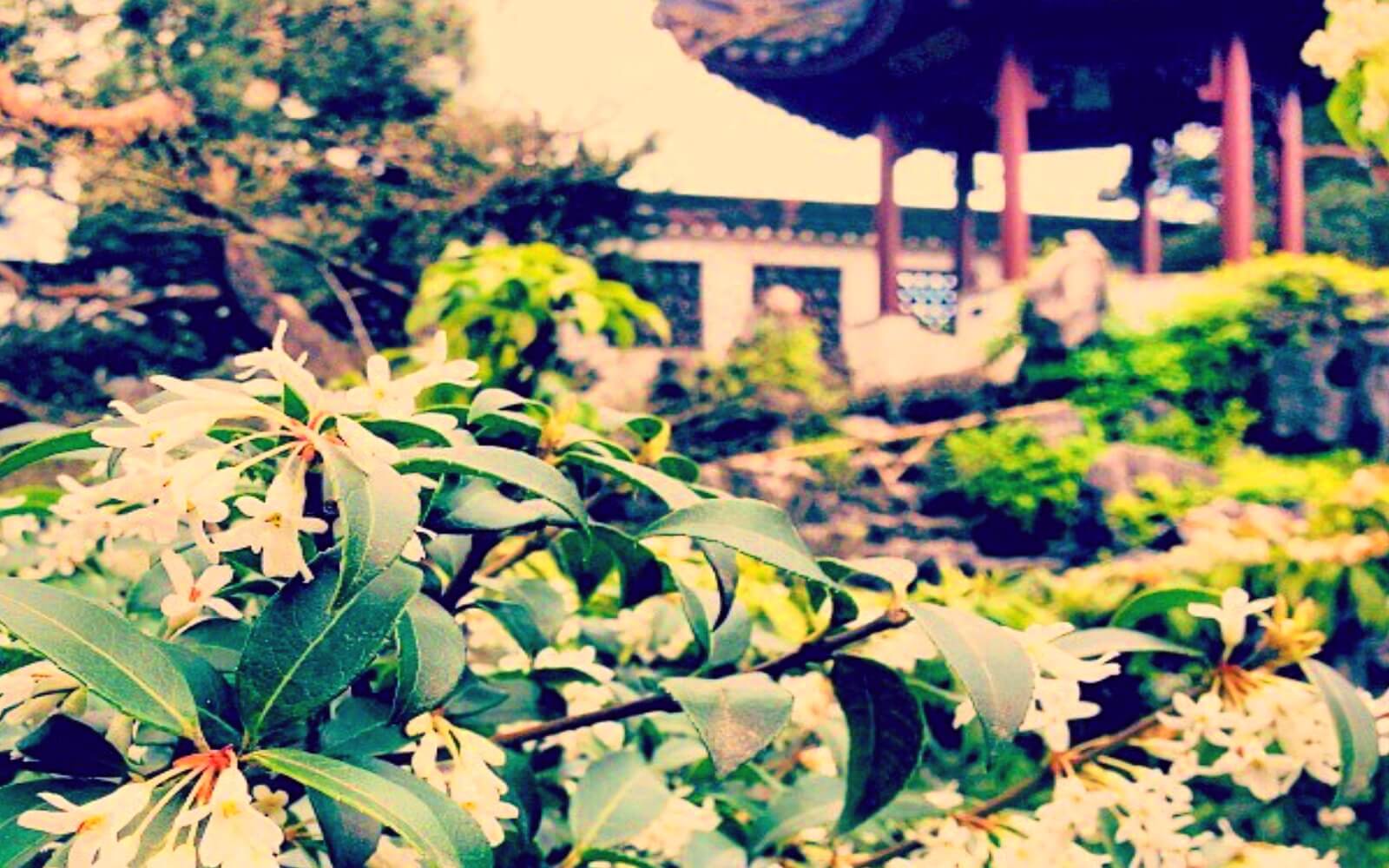
Likely the main attraction for most visitors, the flowers, plants and trees represent nature in its most form. Their brightness and fullness contrasts perfectly with the sharp edges, straight lines and muted colours of the rocks.
In order to provide visitors with vivid colours throughout the year, even if you’re visiting Vancouver in winter.
The flowers are carefully chosen in accordance with their blooming schedules to accentuate seasonal changes.
In fact, the Pine, Bamboo and Plum Trees that form the foundation of the garden are known as the “Three Friends of Winter”. This means they’ll remain in full bloom even in the deepest depths of the Canadian Winter.
Each tree carries a deep symbolic meaning.
For instance, Bamboo Trees are known to reflect knowledge, wisdom, and flexibility. Pine Trees represent longevity and tenacity, while Plum Trees signal rebirth and renewal, as they flower in the spring in Vancouver.
Of the numerous flowers present in the garden, among the most prized are the peonies, orchids, and lotuses, which not only delight visitors with their bright and vivid colours, but represent opulence, love, and purity in Chinese philosophy.
The seasonal changes that take place in the flowers’ colours contrast with the static permanence of the rocks and architecture.
Even the aromas and sounds they emit in inclement weather provide indications of vitality that contrast even further with the dull, cold nature of the rocks.
Related: Visiting Vancouver in Summer
Dr. Sun Yat-Sen Garden Architecture

The fourth element of a Classical Scholar’s Garden is architecture, typically in the form of pavilions, temples, kiosks and bridges.
The structures are designed to be in harmony with the landscape, rather than to overwhelm it. They’re also intended to provide a variety of unique viewpoints of the various plants, ponds, and rocks.
Often located near ponds, the buildings often appear to be floating on water and thus provide a stark contrast to the stillness and tranquility of the ponds. They are also designed to create stunning reflections, providing visitors with breathtaking photo opportunities.
The largest pavilion at the Classical Garden provides an important congregation point for tours, classes and lectures for visitors, tour groups and school field trips.
Related: The Best Sightseeing Tours in Vancouver
Dr. Sun Yat-Sen Classical Chinese Garden Prices
While entry to the public park is free, there is a small admittance fee for entry into the Classical Garden itself.
The proceeds go towards the upkeep of the facility.
- Adult: $16.00
- Senior: $13.00
- Student (with valid ID): $12.00
- Family (up to two adults and three children): $32.00
Tickets can be booked using the calendar below:
Dr. Sun Yat-Sen Classical Chinese Garden Hours
We recommend allotting at least one hour for your visit to the Classical Garden.
In 2023 it’s open Wednesday to Sunday between 10:00 am and 3:00 pm (last entry 2:00 pm)
How to Get to Dr. Sun-Yat Sen Gardens
Address: 578 Carrall Street
The Dr. Sun Yat-Sen Classical Chinese Garden is located right in the heart of Chinatown, on the fringes of Downtown Vancouver.
Directions
Our recommended way to reach the Classical Garden is via the Skytrain, which services the area via the Stadium-Chinatown Station on the Expo Line.
From the station the garden is located just a short 5 minute walk away along Keefer Street.
Alternatively, you can also make a fifteen minute stroll from nearby Gastown if you happen to be in the area.
For custom directions simply click on the Google Maps link provided above.
For more information on the Skytrain visit our Vancouver public transportation guide.
Sun Yat-Sen Gardens Vancouver Visitor Tips
1) Purchase your tickets in advance
During peak hours during the busy summer tourist season, you may encounter lines at Classical Chinese Garden, especially if a tour bus has just shown up.
We’d recommend purchasing tickets in advance so you can spend more time experiencing the garden than bumping shoulders with other tourists.
2) Visit early to beat the crowds
I’ve spent this entire article waxing poetic about the peace and tranquility that you’ll feel during your visit to the Classical Garden.
However, any experienced traveller will know, there are few things that can do more to ruin a sense of peace and tranquility than a fervid horde of tourists.
As a result, our recommendation is to visit as close to opening time as possible, before the masses start to show up in the early afternoon.
3) Take the guided tour
If you check out the reviews on Trip Advisor you’ll find that most people either loved or hated their visit to the Classical Garden.
While there is no doubt that Gardens can be a niche attraction, there is one principle factor that influences people’s experience.
The people who loved it took the free 45-minute guided tour!
Your knowledgeable guide will help you to fully understand the symbolism involved in a Classical Scholars Garden and the deep meaning of the flowers and materials chosen.
You will receive a wealth of information that you would otherwise be likely to miss. And you’ll also receive a complimentary cup of Chinese tea!
For more information on the tours visit the Classical Garden website.
4) Visit Chinatown and Gastown
The Classical Garden is located right in the heart of the largest Chinatown in Canada. It also offers a wealth of interesting options for curious visitors.
Whether you choose to take a walking tour, do some epic Vancouver shopping or sample some of the authentic Chinese cuisine, there is sure to be something for any visitor.
If you’re looking for restaurant ideas, be sure to check out our best restaurants in Chinatown.
Also, one of the best areas to stay in Vancouver is found in historic Gastown, just a 5-minute walk from the gardens.
Here you’ll find tons of the city’s top bars and restaurants.
Dr. Sun Yat-Sen Classical Garden History
The Dr. Sun Yat-Sen Classical Garden was constructed as a joint venture between the Canadian and Chinese governments in 1986 for the Expo ’86 World’s Fair.
It was erected in order to promote Chinese culture and maintain and enhance the understanding between China and the West.
The garden is named after Dr. Sun Yat–Sen, the famed Chinese Nationalist leader, who is considered the founding father of the Republic of China.
Yat-Sen played an instrumental role in the overthrow of the Qing Dynasty in the Xinhai Revolution, before serving as the first president of Republican China.
While in exile, he spent a considerable amount of time in Vancouver’s Chinatown, where he raised money to fund the revolution.
A figure of universal reverence, Yat-Sen is one of the few individuals who remains popular in both the People’s Republic of China and across the Straits of Formosa in Taiwan.
This factor, in addition to his extensive history in Chinatown, made the naming of the park a no brainer during a time of heightened Cold War tensions.
Dr. Sun Yat-Sen Gardens FAQ
Where is the Dr. Sun Yat-Sen Classical Chinese Garden located?
The Dr. Sun Yat-Sen Classical Chinese Garden is located at 578 Carrall Street in the heart of Vancouver’s Chinatown.
How much is entry to the Dr. Sun Yat-Sen Classical Garden?
Entry for adults costs $12 during the low season and $14 in high season. Seniors pay $9 during low season and $10 during high season. Students and youth pay $10 in the low season and $11 during high season.
What is the Dr. Sun Yat-Sen Classical Chinese Garden?
The Dr. Sun Yat-Sen Classical Chinese Garden is the first Classical Chinese Scholars Garden constructed outside of Asia.
In order to instill a sense of peace and tranquility, the garden is constructed in accordance with Taoist principles.
As such, it employs a balance of the four essential elements (rocks, waters, plants, and architecture).
When was the Dr. Sun Yat-Sen Classical Chinese Garden constructed?
The Dr. Sun Yat-Sen Classical Chinese Garden was constructed in 1986 as a joint venture between the Chinese and Canadian governments to promote peace and understanding between the two countries.
What are the hours of the Dr. Sun Yat-Sen Classical Chinese Garden?
The Dr. Sun Yat-Sen Chinese Classical Garden opens at 10:00 am, except during the Summer when it opens at 9:30 am.
Closing times vary by season, from 4:30 pm during the Winter to 6:00 pm during the Spring and Fall and 7:00 pm during the Summer.
Visiting Dr. Sun Yat-Sen Classical Chinese Garden?
Hopefully, you now know everything you need to know about your visit to the Dr. Sun Yat-Sen Classical Chinese Garden.
But if you’ve got any other questions, don’t be afraid to plant them on me, either in the comment section below or on the Vancouver Planner Facebook page.
Safe travels.

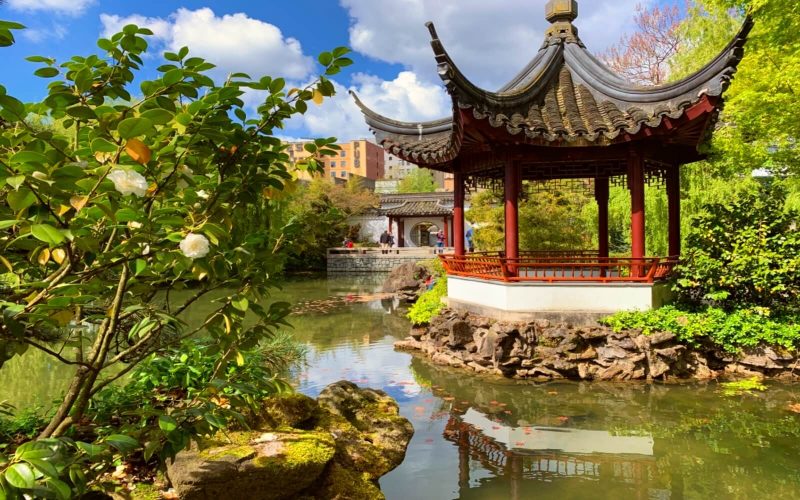

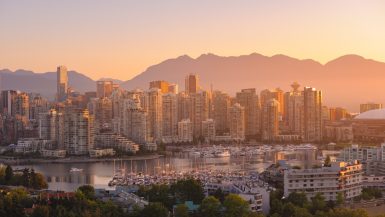

Leave a reply